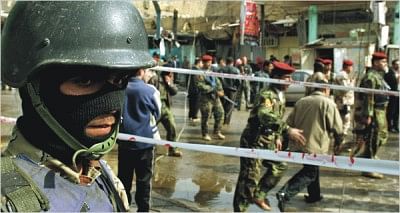Palestine scene
Mahmood Elahi, Iris Street, Ottawa, Canada
Both Palestinian President Mahmoud Abbas and Hamas have been elected by the Palestinian people, then why are they slaughtering each other? Only two months ago, they signed an agreement ending the earlier factional fighting and formed a government of national unity. But instead of bringing unity, Fatah and Hamas have resumed their infighting in which they are killing each other without any restraint.Latest bloodlettings started when Hamas gunmen raided the house of an important Fatah leader, killing his guards. In the ensuing fighting, both Hamas and Fatah gunmen have been attacking each other in the Gaza Strip while blaming Israel for their own brutality toward each other. Fighting continued even after rival Palestinian factions renewed a pledge on May 14 to stop killing. But gunmen loyal to Hamas and Fatah continue to battle each other. With the casualty toll mounting, Interior Minister Hani Kawasmeh resigned, accusing leaders on both sides of fomenting the violence. People of Gaza found the latest violence more ominous than the previous rounds, saying it signaled to the total animosity between the two Palestinian factions and their desire to destroy each other in the name of the Palestinian people. Both claim that they are elected by the Palestinian people and must have total power. They fail to realise that Hitler was also elected by the German people before he started to destroy his opponents. "Now they are starting off from where they left ," said Jamal Abu Shabaan, a Gaza resident to the Associated Press. "If they get to each other's throat, they won't let go this time." At the centre of the new Palestinian infighting is a dispute over who controls the security forces. A majority of 80,000 security officers in the West Bank and Gaza are loyal to Palestinian President Mahmoud Abbas, the Fatah leader, while Hamas set up its own 6,000-strong militia last year. These two heavily-armed groups are determined to destroy each other. Renewed violence between them will continue to cast a dark shadow if they cannot find a way to live together. As such, this may be the time for the violent factions to rethink about the methods they are using to fight each other and Israel. Only by eschewing violence, they can make any progress toward peace and stability. They may look to Mahatma Gandhi who gained India's independence non-violently. When Gandhi launched his anti-colonial movement against the British rule in India, he rejected out of hand any violence in the name of anti-cololonialism. Here are his own words: "If India makes violence her creed, I will not care to live in India. She will fail to evoke any pride in me." Gandhi rejected the idea that the end justifies the means. For him, the means must be noble if the end is noble. When some militants in his movement attacked a police station, he called off his non-violent movement. Only after being assured that there would be no recourse to violence, Gandhi resumed his struggle. Although Gandhi was assassinated by a Hindu extremist who thought he was too soft on what he considered as the Muslim enemy, he gained India's independence without taking a single British life. Gandhi had shown the world a way to fight oppression without having to kill. The same applies to violent groups like Hamas and Fatah, which can achieve their goals through non-violent political actions. The only way Hamas and Fatah can stop killing each other is by renouncing violence in the name of politics.
|

|